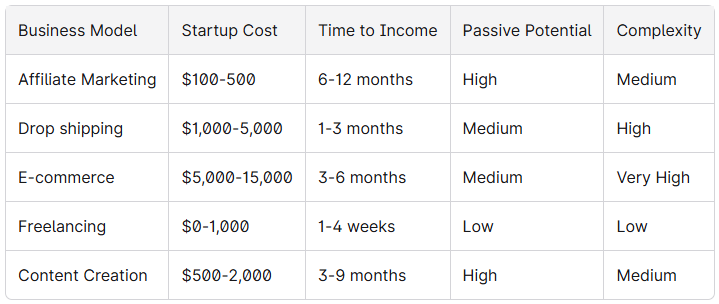Key Takeaways
- Affiliate marketing is a legitimate $17 billion industry used by major companies like Amazon, but a successful affiliate marketing business requires 6-12 months of consistent effort
- While 84% of publishers use affiliate programs, many affiliate marketers only earn around $20,000 annually - not the overnight riches often promised
- Success depends on choosing the right niche, building quality content, and avoiding common scams like pay-to-join programs
- Unlike dropshipping or e-commerce, affiliate marketing requires minimal upfront investment but demands significant time investment in content creation and SEO
- It’s worth your time if you’re willing to treat it as a real business, requiring 1-2 years to build substantial income streams
Every day, thousands of people search the internet to for the truth about affiliate marketing legitimacy and whether it’s a worthwhile investment of their time. The affiliate marketing industry has exploded to $17 billion in 2023, with projections reaching $28 billion by 2027, yet most people still wonder: is affiliate marketing legit, and more importantly, is it worth the effort?
The short answer is yes - affiliate marketing is completely legitimate. However, the question of whether it’s worth your time requires a much more nuanced discussion. Unlike the get-rich-quick schemes that flood social media platforms, successful affiliate marketing demands significant time investment, strategic thinking, and realistic expectations about income potential.
This comprehensive guide will give you the unvarnished truth about affiliate marketing, helping you make an informed decision based on facts rather than hype. We’ll explore the legitimacy of the affiliate marketing business, expose common affiliate marketing scams, set realistic income expectations, and provide a framework for determining if this path aligns with your goals and circumstances.
The Straight Answer: Affiliate Marketing Legitimacy
Affiliate marketing is completely legitimate - major companies like Amazon (since 1996), The New York Times, and NerdWallet have built substantial revenue streams through affiliate programs. The affiliate marketing industry has grown from just over $1 billion in 2010 to $17 billion in 2023, representing a compound annual growth rate of approximately 18%.
The legitimacy of affiliate marketing stems from its fundamental business model: affiliate marketers promote real products or services to actual customers, earning commissions based on measurable sales, leads, or traffic. This performance-based approach benefits all parties involved - merchants gain access to new customers, affiliates earn money for successful referrals, and consumers discover products that meet their needs.
Regulatory oversight further validates the affiliate marketing business model. The Federal Trade Commission (FTC) requires proper disclosure of affiliate relationships, treating affiliate marketing as a recognized form of advertising. This regulatory framework distinguishes legitimate affiliate marketing programs from pyramid schemes, which focus on recruitment rather than actual product sales.
Major affiliate networks like Commission Junction (CJ Affiliate), and Rakuten facilitate billions of dollars in transactions annually, providing tracking, reporting, and payment infrastructure that supports the entire ecosystem. These reputable affiliate networks maintain strict quality standards and fraud prevention measures, further legitimizing the industry.
The adoption statistics speak volumes: 26% of marketers consider affiliate marketing a reliable revenue source, with 84% of publishers using affiliate programs as part of their monetization strategy. This widespread acceptance among mainstream businesses confirms that affiliate marketing is not only legitimate but essential to modern digital marketing strategies.
However, legitimacy doesn’t guarantee a successful affiliate marketing business or quick results. It typically takes 6-12 months to see meaningful income from affiliate marketing work, not the days or weeks promised by many affiliate marketing scams. Understanding this timeline is crucial for setting realistic expectations about your affiliate business.
Common Affiliate Marketing Scams to Avoid

While affiliate marketing itself is legitimate, the industry attracts bad actors who exploit newcomers’ desire for quick profits. Recognizing these affiliate marketing scams can save you time, money, and frustration as you begin your affiliate marketing efforts.
The most prevalent scam involves pay-to-join affiliate programs that charge upfront fees for access to “exclusive” opportunities. Legitimate affiliate marketing programs are always free to join - reputable programs, like Amazon Associates, Digistore24, and other established affiliate networks never require payment from potential affiliates. Any program demanding money upfront should be avoided immediately.
Fake gurus represent another significant threat to aspiring affiliate marketers. These individuals sell expensive courses promising secret affiliate marketing strategies, despite having little or no proven affiliate marketing success themselves. They often showcase rented cars, fake income screenshots, and testimonials from actors to create an illusion of success. Before purchasing any affiliate marketing course, research the instructor’s actual affiliate marketing track record, talk to other affiliates, and look for verifiable case studies.
Product-related scams involve promoting low-quality or non-existent products that can severely damage your reputation and affiliate business. Some unscrupulous merchants create fake products solely to exploit affiliate marketers, then disappear with the promotional fees. Always research products thoroughly before promoting them, and make sure you're choosing affiliate programs that are reputable and have established track records.
Technical scams like cookie stuffing and spoof traffic schemes exploit affiliate tracking systems to generate fraudulent commissions. These practices violate most affiliate program terms of service and can result in account termination and commission forfeiture. Legitimate affiliate marketing success comes from genuine traffic and authentic customer recommendations, not technical manipulation.
Perhaps the most damaging are get-rich-quick schemes that promise unrealistic overnight success without effort. These scams prey on people’s desire for passive income, claiming you can “earn $5,000 per month while you sleep” with minimal work. The reality is that successful affiliate marketing requires consistent effort, quality content creation, and strategic marketing - typically 10-20 hours per week for 12-24 months before seeing substantial results.
To avoid affiliate marketing scams, remember that legitimate opportunities require time and effort rather than upfront payment. Focus on joining good affiliate programs through reputable and established affiliate networks, and be skeptical of any promises that seem too good to be true.
Real Income Potential and Timeline Expectations

Understanding realistic income potential and timelines is crucial for determining whether affiliate marketing is worth your time investment. The data reveals a significant gap between marketing promises and actual results for most affiliate marketers.
According to industry research, 80% of affiliate businesses earn around $20,000 annually, with 77% operating as solopreneurs. This means the many affiliate marketers generate supplemental income rather than full-time livings. The income distribution follows a typical Pareto principle, where approximately 10% of affiliates generate 90% of the industry’s revenue.
However, success stories do exist. Pat Flynn, a well-known affiliate marketer, earned $125,000 in one month during 2017 and recently generated $230,000 in 63 hours through a specific campaign. These exceptional results come from years of audience building, brand development, and strategic positioning in profitable niches.
The realistic timeline for affiliate marketing success breaks down into distinct phases:
Months 0-3: Foundation Building During this initial phase, most affiliate marketers see minimal income - often less than $100 per month. This period focuses on niche selection, creating an affiliate website, content development, and joining appropriate affiliate programs. The primary goal is establishing a foundation rather than generating immediate revenue.
Months 6-12: Growth and Optimization Affiliate marketers who persist through the initial phase typically begin seeing steady monthly income ranging from $500 to $2,000. This growth comes from accumulated content, improved search engine optimization, and better understanding of their target audience preferences.
Years 1-2: Scaling and Diversification Successful affiliate marketers often reach $5,000 to $15,000 monthly income during this phase. This success requires diversifying affiliate partnerships, expanding content creation, and potentially building email lists for direct audience engagement.
Beyond Year 2: Substantial Income Potential The most successful affiliate marketers can generate six-figure annual incomes, but this represents a small percentage of all participants. This level requires treating affiliate marketing as a serious business, often involving team members, advanced affiliate campaigns, and multiple revenue streams.
Income depends heavily on niche selection, traffic generation methods, and content quality. High-paying affiliate programs in finance, technology, and business software typically offer higher commission rates but require more expertise and trust-building. Lower-paying programs in consumer goods may convert more easily but require higher volume for substantial income.
Most affiliate marketers underestimate the time investment required. Successful affiliate marketing work typically demands 15-25 hours per week of consistent effort promoting products, including content creation, search engine optimization, social media marketing, and performance analysis. This time investment must continue for 12-18 months before seeing meaningful returns.
How to Start Affiliate Marketing the Right Way
Starting affiliate marketing correctly from the beginning significantly improves your chances of success and helps you avoid common pitfalls that derail many beginners’ efforts.
The foundation of successful affiliate marketing lies in strategic niche selection. Choose a niche based on three critical factors: personal interest, market demand, and manageable competition. Your genuine interest ensures you can create authentic content consistently, while market demand guarantees potential customers exist. Analyzing competition helps identify opportunities where you can differentiate yourself.
Building your own affiliate website provides the most sustainable foundation for long-term affiliate marketing success. While social media platforms offer immediate reach, algorithm changes can instantly destroy your audience access. WordPress remains the most popular choice for affiliate marketing websites due to its flexibility, SEO capabilities, and extensive plugin ecosystem. Expect to invest $100-200 annually for domain registration and hosting services.
Joining reputable affiliate programs should be your next priority after establishing your website. Amazon Associates offers an excellent starting point due to its massive product catalog and trusted brand recognition, though commission rates are relatively low (1-10% depending on product categories). Commission Junction provides access to thousands of merchants across various niches, offering higher commission rates for many products.
Creating high quality content forms the cornerstone of successful affiliate marketing efforts. Focus on solving specific problems your target audience faces rather than simply promoting products. Product reviews, comparison guides, tutorials, and industry insights perform better than obvious promotional content. Search engines and audiences both reward valuable content that genuinely helps readers make informed decisions.
Building organic traffic through search engine optimization provides the most sustainable growth strategy for affiliate marketing websites. Unlike paid advertising, which stops generating traffic when you stop paying, SEO efforts compound over time. Target long-tail keywords with commercial intent, such as “best [product] for [specific use case]” rather than broad, competitive terms.
Platform Selection: Website vs Social Media

Choosing the right platform for your affiliate marketing efforts significantly impacts your long-term success potential and business sustainability.
Websites provide superior long-term control and SEO benefits compared to social media dependency. When you own your website, you control the content, design, user experience, and monetization strategies without external platform restrictions. Search engines treat websites as authoritative sources, enabling you to rank for valuable keywords that drive targeted traffic over many years.
Social media platforms like YouTube, TikTok, and Instagram offer immediate audience access and viral potential, but they come with significant limitations. Algorithm changes can instantly reduce your reach, platform policies can restrict affiliate marketing activities, and account suspensions can eliminate years of work overnight. However, these platforms can effectively supplement a website-based strategy.
YouTube provides excellent opportunities for affiliate marketers who excel at video content creation. Product reviews, tutorials, and comparison videos perform particularly well, and YouTube’s search function helps discover your content years after publication. The platform’s monetization options complement affiliate income through ad revenue sharing.
TikTok and Instagram work well for affiliate marketers targeting younger demographics and visual products. Short-form video content showcasing product demonstrations, before-and-after results, and lifestyle integration can drive significant affiliate sales. However, these platforms typically require constant content creation to maintain visibility.
The cost comparison heavily favors website ownership for long-term sustainability. Domain registration and hosting cost approximately $100-200 annually, while social media accounts are free to create. However, the hidden costs of social media dependency include vulnerability to platform changes, limited monetization control, and difficulty building owned email lists for direct audience communication.
Most successful affiliate marketers use a hybrid approach: their own website as their primary hub supplemented by social media platforms for traffic generation and audience engagement. This strategy provides platform diversification while maintaining control over your primary business asset.
Niche Selection Strategy
Effective niche selection can make or break your affiliate marketing success, requiring careful analysis of market dynamics, competition levels, and profit potential.
High-demand niches typically include health and fitness, personal finance, technology, lifestyle, and dating. These categories generate substantial search volume and offer numerous affiliate programs with attractive commission structures. However, popular niches also attract intense competition from established affiliate marketers and major publications.
Avoid overly broad niches like “beauty” or “technology” that encompass too many subtopics and face overwhelming competition. Instead, narrow your focus to specific subcategories like “skincare for sensitive skin” or “productivity software for freelancers.” This specificity helps you become an authority figure while facing manageable competition levels.
Research keyword competition using tools like Google Keyword Planner, SEMrush, or Ahrefs to understand the difficulty of ranking for relevant terms. Look for keywords with decent search volume (1,000+ monthly searches) but moderate competition scores. Long-tail keywords often provide easier ranking opportunities while attracting highly targeted traffic.
Commission rate analysis should factor into your niche selection decision. While higher commission rates appear attractive, consider the total earning potential based on product prices and conversion likelihood. A 5% commission on a $1,000 software subscription generates more revenue than a 50% commission on a $20 physical product, assuming similar conversion rates.
Evaluate the niche’s long-term viability by analyzing trends, seasonal patterns, and market growth projections. Some niches experience rapid growth but quick saturation, while others provide steady demand over many years. Google Trends helps identify whether interest in your chosen niche is growing, stable, or declining.
Consider your ability to create authentic, valuable content within your chosen niche. Your personal experience, professional expertise, or genuine interest in the topic enables you to produce content that resonates with audiences and stands out from generic promotional material.
Affiliate Marketing vs Other Online Business Models

Understanding how affiliate marketing compares to other online business models helps you make informed decisions about where to invest your time and resources for maximum return potential.
Affiliate Marketing vs Dropshipping
Affiliate marketing eliminates the operational complexities that make dropshipping challenging for beginners. With affiliate marketing, you don’t handle inventory management, shipping coordination, or customer service issues. When customers have problems with products, they contact the merchant directly rather than you, eliminating significant time drains and potential conflicts.
Dropshipping requires managing supplier relationships, handling returns and refunds, and maintaining customer satisfaction across the entire purchase experience. These responsibilities create ongoing operational overhead that affiliate marketing avoids entirely. However, dropshipping typically offers higher profit margins per sale compared to affiliate commissions.
Affiliate Marketing vs E-commerce
The startup cost difference between affiliate marketing and traditional e-commerce is substantial. Affiliate marketing requires minimal initial investment - typically $100-500 for a website, hosting, and basic tools. E-commerce businesses often need $5,000-10,000 or more for inventory, storage, website development, and marketing campaigns.
E-commerce provides complete control over pricing, customer relationships, and brand development, but requires significantly more time and expertise to manage successfully. Affiliate marketing allows you to focus solely on traffic generation and content creation while leveraging established brands’ credibility and conversion optimization.
Affiliate Marketing vs Content Creation
Affiliate marketing can monetize existing content without requiring product development or course creation. If you already produce valuable content through blogging, videos, or social media, affiliate programs provide immediate monetization opportunities. Content creators developing their own products face additional challenges including product development, customer support, and payment processing.
However, content creators who successfully develop their own products typically achieve higher profit margins and greater control over their business model. The trade-off involves significantly more complexity and risk compared to affiliate marketing’s simpler approach.
Affiliate Marketing vs Freelancing
Affiliate marketing offers potential for passive income that freelancing cannot match. Once you create content that ranks well in search engines, it can generate affiliate commissions for months or years with minimal ongoing maintenance. Freelancing requires active time investment for every dollar earned, limiting your income potential to available working hours.
Freelancing provides more predictable income and faster initial results compared to affiliate marketing’s longer development timeline. Many successful affiliate marketers start with freelancing to generate immediate income while building their affiliate marketing business during evenings and weekends.

This comparison reveals affiliate marketing’s unique position as a low-cost entry point with high passive income potential, though it requires patience and persistence to achieve meaningful results.
Critical Success Factors

To earn money with affiliate marketing depends on mastering several critical factors that separate profitable affiliate marketers from those who struggle to generate meaningful income.
Content Quality Over Quantity
Search engines increasingly prioritize high quality content that provides genuine value to readers over keyword-stuffed promotional material. Google’s algorithms can detect and penalize low-quality, AI-generated content that doesn’t offer unique insights or helpful information. Successful affiliate marketers focus on creating comprehensive, well-researched content that answers specific questions and solves real problems.
This means investing significant time in product research, personal testing when possible, and understanding your target audience’s actual needs rather than simply promoting high-commission products. Quality content naturally attracts backlinks, social shares, and return visitors, all of which improve search engine rankings and increase affiliate income potential.
Transparency and Proper FTC Disclosure
Building long-term audience trust requires transparent disclosure of affiliate relationships according to FTC guidelines. Proper disclosure not only ensures legal compliance but actually enhances credibility with your audience. Readers appreciate honesty about affiliate partnerships and are more likely to trust recommendations from affiliate marketers who clearly identify their financial relationships.
Effective disclosure goes beyond legal requirements to explain how affiliate programs work and why you choose specific products to recommend. This educational approach builds authority and trust while differentiating you from affiliate marketers who try to hide their commercial relationships.
Patience and Persistence
Most successful affiliate marketers work consistently for 1-2 years, creating high quality content and promoting products before achieving substantial income streams. This extended timeline challenges many beginners who expect faster results based on unrealistic marketing promises. The compound nature of content marketing means early efforts may show minimal results while later content benefits from accumulated domain authority and audience trust.
Persistence through the initial low-income period separates successful affiliate marketers from those who abandon their efforts prematurely. Understanding that affiliate marketing is a legitimate business requiring long-term commitment helps maintain motivation during challenging early phases.
Continuous Learning and Adaptation
The digital marketing landscape changes rapidly, requiring ongoing education about SEO trends, content marketing strategies, and industry developments. Successful affiliate marketers invest time in learning new techniques, testing different approaches, and adapting to algorithm changes that affect their traffic and income.
This includes staying current with affiliate program policy changes, understanding new disclosure requirements, and discovering emerging platforms where their target audience might be active. The most successful affiliate marketers treat education as an ongoing investment rather than a one-time expense.
Email List Building
Building email lists provides direct access to your audience beyond search engine dependency and social media platform changes. Email marketing allows you to promote relevant affiliate products directly to engaged subscribers while building stronger relationships through valuable newsletter content.
Many successful affiliate marketers generate 30-50% of their affiliate income through email marketing campaigns to their subscriber lists. This direct communication channel provides more control over your marketing message and timing compared to relying solely on organic traffic from search engines.
Diversification and Risk Management
Relying on a single affiliate program or traffic source creates unnecessary business risk. Algorithm changes, program terminations, or policy modifications can significantly impact income if you haven’t diversified your affiliate partnerships and traffic sources.
Successful affiliate marketers typically work with multiple affiliate programs and promote products across several related niches while developing traffic from various sources including search engines, social media platforms, email marketing, and potentially paid advertising. This diversification provides income stability and reduces vulnerability to external changes.
The Verdict: Is Affiliate Marketing Worth Your Time?

Determining whether affiliate marketing is worth your time requires honest assessment of your personal circumstances, goals, and willingness to commit to a long-term business development process.
Affiliate marketing is worth your time if you can realistically commit 10-20 hours weekly for 12-24 months consistently without expecting immediate income. This time investment must come from discretionary hours rather than replacing essential income-generating activities, as affiliate marketing typically requires 6-12 months before producing meaningful revenue.
The decision becomes favorable if you enjoy writing, researching products, and building online presence through content creation and social media marketing. Affiliate marketing success requires creating valuable content consistently, engaging with your audience authentically, and staying current with digital marketing trends. If these activities align with your interests and natural abilities, the time investment becomes more sustainable and enjoyable.
Consider your opportunity cost carefully. Could your available time generate more immediate income through freelancing, part-time employment, or other business opportunities? For many people, the delayed gratification required for affiliate marketing success conflicts with more pressing financial needs that require immediate income generation.
Your technical comfort level significantly impacts success potential in affiliate marketing. While you don’t need advanced programming skills, basic competency with website building, search engine optimization, content management systems, and analytics tools is essential. If learning these skills excites you, affiliate marketing provides excellent motivation for developing valuable digital marketing capabilities.
Affiliate marketing becomes particularly attractive for people who already create content through blogging, video production, or social media but haven’t monetized their efforts effectively. These individuals already invest time in content creation and audience building, making affiliate programs a natural revenue addition rather than a complete business pivot.
Financial stability affects the viability of affiliate marketing as a business choice. If you need immediate income to cover essential expenses, affiliate marketing’s delayed gratification model may not suit your circumstances. However, if you have stable income from other sources and can invest time in building future passive income streams, affiliate marketing offers excellent long-term potential.
The decision framework should also consider your local market opportunities. In some geographic areas or professional situations, affiliate marketing provides access to global markets and income opportunities that local businesses cannot match. This global reach can be particularly valuable for people in smaller markets or developing economies.
Decision Framework Questions:
- Can you commit 15+ hours weekly for 18+ months without guaranteed income?
- Do you enjoy writing, researching, and creating online content?
- Are you comfortable learning basic technical skills like SEO and website management?
- Do you have stable income that allows for long-term business investment?
- Would you pursue content creation even without affiliate income potential?
If you answered yes to most of these questions, affiliate marketing likely represents a worthwhile time investment. If you answered no to several questions, consider alternative business models that better match your circumstances and goals.
Remember that affiliate marketing success requires treating it as a legitimate business with professional standards rather than a casual side hustle. The most successful affiliate marketers approach their efforts with the same seriousness they would apply to any other business venture, including proper planning, consistent execution, and ongoing performance measurement.
FAQ
How long does it take to make $1,000 per month with affiliate marketing?
Most affiliate marketers reach $1,000 monthly income after 12-18 months of consistent effort, assuming 15-20 hours of weekly work focused on content creation and SEO. However, this timeline varies significantly based on niche selection, content quality, and marketing strategy effectiveness. Some affiliate marketers achieve this milestone in 8-10 months with exceptional execution, while others may require 2+ years depending on their approach and market competition.
Can you do affiliate marketing without your own website in 2025?
While possible, affiliate marketing without a website significantly limits your long-term success potential. Social media platforms like YouTube, TikTok, and Instagram can generate affiliate income, but algorithm changes and platform policies create substantial business risk. Successful affiliate marketers typically use social media to supplement a website-based strategy rather than replace it entirely. A website provides SEO benefits, audience control, and business stability that social media alone cannot match.
What’s the difference between affiliate marketing and MLM schemes?
Affiliate marketing involves promoting existing products to customers and earning commissions on actual sales, with no recruitment requirements or upfront fees. MLM (multi-level marketing) schemes focus primarily on recruiting new participants rather than selling products, often requiring starter kit purchases and emphasizing recruitment commissions over retail sales. Legitimate affiliate programs are free to join and pay commissions only on genuine customer transactions, while MLMs typically require financial investment and generate most income through recruitment rather than product sales.
How much money do you need to start affiliate marketing?
Affiliate marketing requires minimal startup investment, typically $100-500 for the first year. Essential expenses include domain registration ($10-15 annually), web hosting ($50-150 annually), and basic tools for content creation and SEO analysis ($50-200 annually). Unlike other business models requiring inventory investment or expensive equipment, affiliate marketing’s low startup costs make it accessible to most people willing to invest time and effort in building their business.
Is affiliate marketing still profitable with increased competition?
Affiliate marketing remains profitable despite increased competition, but success requires more sophisticated strategies than in previous years. The key is finding underserved niches, creating exceptionally high-quality content, and building genuine audience relationships rather than relying on simple SEO tactics. While competition has increased, so has the overall market size, creating opportunities for affiliate marketers who differentiate themselves through expertise, authenticity, and valuable content that genuinely helps their audience make informed purchasing decisions.


